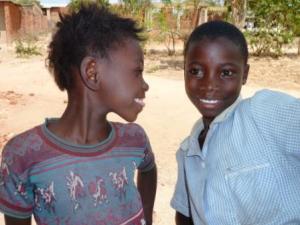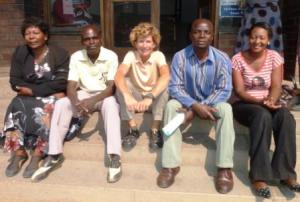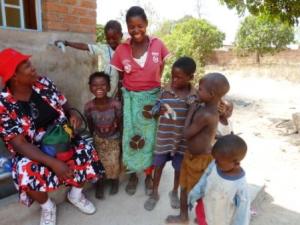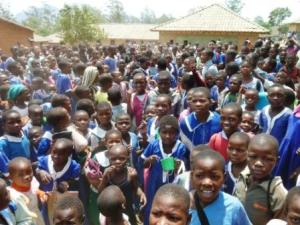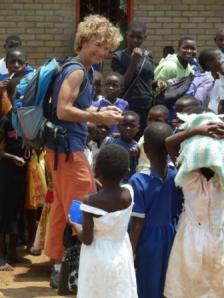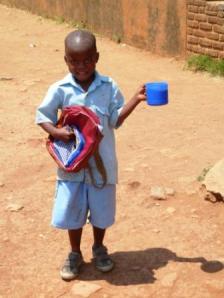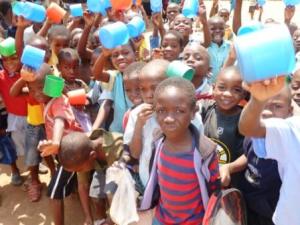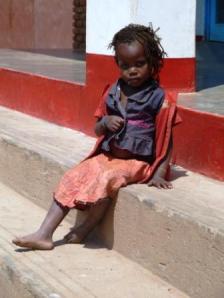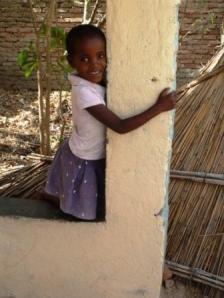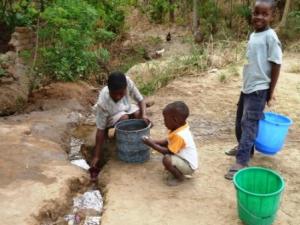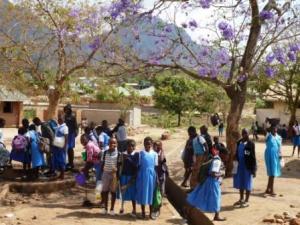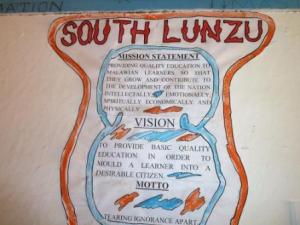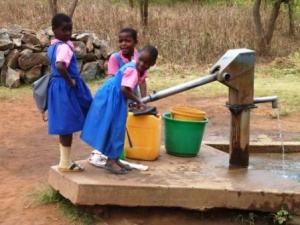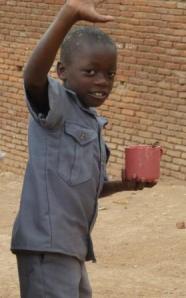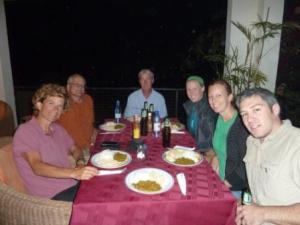With the end of our assignment fast approaching, I’m finding myself reflecting on the past few weeks. It will probably take a little while for it all to fully sink in but what I know for sure is that I’ll come back into our privileged world with a somewhat different outlook on life and an abundance of gratitude for how fortunate I am. There is no question that one cannot be changed by an experience like this one. The question is how best to channel this new insight on life. Africa is so awe-inspiring and such a marvelous teacher. My stay in the Heart of Africa has offered so many great lessons … lessons of patience, lessons of tolerance, lessons of adaptability, lessons of resiliency, lessons of appreciation and lessons of hope.
Africa teaches patience
My patience (and most of you know I’m not known for having a lot of it to begin with) was tested every morning. Trying to get everyone focused and organized at the office for our work in the field was SO challenging. Just when I thought I had everyone together and on the same page, someone would disappear. We would show up at the office just before 8am, and on a good day we would be on our way sometime between 9:30 and 10am. The morning routine could only be described as inefficient, chaotic and frustrating. But this is Africa … one can’t survive without patience because everything seems to take 10 times longer hear for some reason. So after a few days, I found a new rhythm (unfortunately didn’t find the dancing rhythm yet) and learned to chill.
My patience was also tested in a very big way when we got stuck in the biggest cluster-fuck (pardon my French) traffic jam where all the vehicles from a major road were re-routed into a narrow dirt-alley (can’t even call it a road) lined with structures on both sides and filled with what felt like crater-like potholes. With vehicles, some filled with animals and some jammed with people, trying to move in both directions with less than an inch of clearance in some areas and some vehicles breaking down and being pushed by people, we got totally stuck for well over an hour. In 90+ degree temps with absolutely no breeze and nowhere to go, I felt myself getting a little aggravated. And then I looked at the public mini-van facing the other way and stuck beside us with its side-mirror almost touch ours, and saw the 20+ Malawians stuck in it with only a few windows barely open. They were all waiting very patiently without any sign of annoyance. Yes, Africa does indeed teach you about patience.
And what about the slow internet. Although the wireless speed at the Kabula Lodge was so much better than expected, that of the WFP office was a different story … and that’s when it was working, which it didn’t for about half the time we were there. Having to wait a minute every time you try to open up a new web page was a little aggravating but at least we had internet, something none of the 800+ low-income households we visited benefited from. Most homes don’t even have a bed or table in their house, so a computer is not really high on the “to buy” list.
Finally, it was pretty admirable how everyone we interviewed, whether it was a mother resting between her multiple trips to a communal water points, a doctor at a clinic with a waiting room overflowing with sick people, or a headteacher at a school with thousands of screaming students running around, patiently answered all our survey questions and took the time to show us their water and sanitation facilities. My guess is that in the US, very few people would have even open up their doors to us, and even a fewer number would have given us 30 minutes of their time for a survey.
Africa teaches tolerance
When coming to Africa, one definitely needs to adjust to some pretty significant cultural difference. For example, punctuality isn’t all that important to people here. I had a discussion with my team one morning about how in the US, being late and wasting someone’s time in some cases could be perceived as a lack of respect. It was obvious that this was a totally foreign concept to them.
Tolerance also came into play when we learned that the entire WFP-Malawi staff was going to be away on a 2-day team-building retreat while we were here. It’s seems like having their retreat overlap with our visit wasn’t conducive to maximizing our time here but I tried to be open-minded about their decision to leave us on our own for a few days.
Whereas a tribal system seems to dominate the way of life in many parts of the world, especially in northern African and the Middle-Eastern countries, here in Malawi that system doesn’t really come in to play when choosing who you will marry and associate/identify with. There seems to be great tolerance for religious freedom also, with Christians and Muslims mingling together peacefully in Blantyre and the remote villages we visited.
One of the best examples of the Malawians’ natural propensity for tolerance is the moto of the South Lunzu primary school I found on a poster in the headteacher’s office – “Tearing Ignorance Apart.” (see photo). Mind you this is a school of 8,000+ students in one of the poorest parts of the world and their moto is about fighting ignorance. Yes in some instances it seems like Africa is so far ahead of us.
But first and foremost, what is striking is how people here are tolerant of the miserable conditions that are part of their every-day lives. Now I’m not exactly sure if that’s good or bad but when you think about it, what other choice do they really have.
Africa teaches adaptability and resiliency
This continent is really not recommended for those who can’t adapt or be resilient. For example, we learned to adapt to daily power outages, some of which were triggered by planned rolling blackouts, which seemed to always hit our lodge at dinner time. So you learn to have your headlamp around your neck at night … just in case. BTW – this is something most people in remote villages have to adapt with because they don’t have power to begin with.
Being the only white person everywhere I went during the day took some getting used to at first. The significant amount of attention we got is something we all had to get accustomed to. In most cases, especially in the more remote areas we visited during the day, I didn’t mind the attention but in Blantyre it could at times be a little disturbing.
Being dirty all the time is something I personally found difficult to adapt to. It is absolutely impossible to stay clean here. When you blow your nose what comes out is back so you get the idea. Having no hot water for a while didn’t help that situation but again, Malawians have to adapt to so much more difficult situations. The adaptability and resilience of the African people allows them to survive with so little … again another great lesson for us with a life of abundance.
Africa teaches appreciation and hope
But the biggest most meaningful lessons of them all is a lesson of appreciation for everything we take for granted – the ability to breath clean air and drink non-contaminated water, to walk on garbage-free streets, to go to a school and health clinic that has sanitation facilities, to give your child more than his or her daily school ration of porridge, to sleep instead of fetching water all night long because that’s the only time it’s available, and the list goes on …
Alyssa was telling the story of the reaction she got when one day she pulled out a tissue to blow her nose. This is something I guess they had never seen before and an extravagance that is almost incomprehensible to them. Using a soft piece of tissue to clean one’s nose is such an outrageous luxury when you think of the conditions in which these people live. There’s no toilet paper in the households, schools and health clinic and in most cases no water close by to wash your hands right after you use the facilities. And here we are with countless choices of tissues and toilet paper with different softness levels to make sure we don’t irritate our precious skin.
With so little, Malawians still find a way to be appreciative for what they have. It’s obvious that they appreciate and value friendships, family and service to others. The appreciation Pattie has shown me is almost overwhelming. She showed up at the office yesterday morning with two chitenjes for mother’s day which is in early October here … the note with the two traditional pieces of clothes said “You know Julie you are Mother Malawi because you are taking care of our life in water and sanitation – we all love you – from your twin sister.” What can I say … I’m so not deserving of this. She and Malawi have given me more during the last few weeks than I will ever be able to give back.
And this leaves us with hope … the hope of a better future for the incredible people of Malawi. We need to give them something to hang on to. At least let’s give them hope because without it, what is left?
